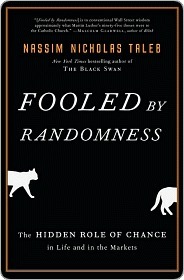More on this book
Community
Kindle Notes & Highlights
Read between
March 10 - April 1, 2020
this business of journalism is about pure entertainment, not a search for truth, particularly when it comes to radio and television. The trick is to stay away from those who do not seem to know that they are just entertainers
the Tragic Vision of humankind that believes in the existence of inherent limitations and flaws in the way we think and act and requires an acknowledgment of this fact as a basis for any individual and collective action. This category of people includes Karl Popper (falsificationism and distrust of intellectual “answers,” actually of anyone who is confident that he knows anything with certainty), Friedrich Hayek and Milton Friedman (suspicion of governments), Adam Smith (intention of man), Herbert Simon (bounded rationality), Amos Tversky and Daniel Kahneman (heuristics and biases), the
...more
that which came with the help of luck could be taken away by luck (and often rapidly and unexpectedly at that). The flipside, which deserves to be considered as well (in fact it is even more of our concern), is that things that come with little help from luck are more resistant to randomness.
Trading forces someone to think hard; those who merely work hard generally lose their focus and intellectual energy. In addition, they end up drowning in randomness; work ethics, Nero believes, draw people to focus on noise rather than the signal
Nero believes that risk-conscious hard work and discipline can lead someone to achieve a comfortable life with a very high probability. Beyond that, it is all randomness: either by taking enormous (and unconscious) risks, or by being extraordinarily lucky.
Heroes are heroes because they are heroic in behavior, not because they won or lost.


